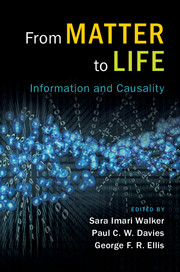Book contents
- Frontmatter
- Contents
- About the authors
- 1 Introduction
- Part I Physics and Life
- 2 The “Hard Problem” of Life
- 3 Beyond Initial Conditions and Laws of Motion: Constructor Theory of Information and Life
- Part II Bio from Bit
- Part III Life's Hidden Information
- Part IV Complexity and Causality
- Part V From Matter to Mind
- Index
3 - Beyond Initial Conditions and Laws of Motion: Constructor Theory of Information and Life
from Part I - Physics and Life
Published online by Cambridge University Press: 02 March 2017
- Frontmatter
- Contents
- About the authors
- 1 Introduction
- Part I Physics and Life
- 2 The “Hard Problem” of Life
- 3 Beyond Initial Conditions and Laws of Motion: Constructor Theory of Information and Life
- Part II Bio from Bit
- Part III Life's Hidden Information
- Part IV Complexity and Causality
- Part V From Matter to Mind
- Index
Summary
Constructor theory (Deutsch, 2013) is a new mode of explanation in fundamental physics, intended to improve on the currently most fundamental theories of physics and explain more of physical reality. Its central idea is to formulate all laws of physics as statements about what transformations are possible, what are impossible, and why. This is a sharp departure from what I call the prevailing conception of fundamental physics, which formulates its statements exclusively in terms of predictions given the initial conditions and the laws of motion. For instance, the prevailing conception of fundamental physics aims at predicting where a comet goes, given its initial conditions and the laws of motion of the universe; instead, in constructor theory the fundamental statements are about where the comet could be made to go, with given resources, under the dynamical laws.
This constructor-theoretic, task-based formulation of science makes new conceptual tools available in fundamental physics, which resort to counterfactual statements (i.e., about possible and impossible tasks). This has the potential to incorporate exactly into fundamental physics notions that have so far been considered as highly approximate and emergent – such as information and life.
The constructor theory of information (Deutsch and Marletto, 2015) has accommodated the notion of (classical) information within fundamental physics and has unified it exactly with what currently goes under the name of ‘quantum information’ – the kind of information that is deemed to be instantiated in quantum systems. This theory provides the conceptual basis for the constructor theory of life (Marletto, 2015a). Here constructor theory is applied to produce the explanation of how certain physical transformations that are fundamental to the theory of evolution by natural selection – such as accurate replication and self-reproduction – are compatible with laws of physics that do not contain the design of biological adaptation. It also shows what features such laws must have for this to be possible: in short, they must allow the existence of information media, as rigorously defined in the constructor theory of information.
Before going into the details of these theories, one has to introduce the foundations of constructor theory. Constructor theory consists of ‘laws about laws’: its laws are principles – conjectured laws of nature, such as the principle of conservation of energy.
- Type
- Chapter
- Information
- From Matter to LifeInformation and Causality, pp. 38 - 58Publisher: Cambridge University PressPrint publication year: 2017



